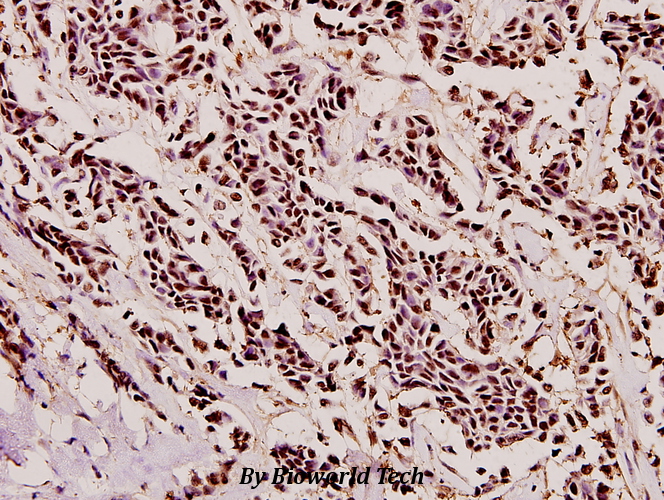Product Name :
TMS1 (E13) polyclonal antibody Background :
Caspase-associated recruitment domains (CARDs) mediate the interaction between adaptor proteins such as APAF1 and the proform of caspases (e.g. CASP9) participating in apoptosis. ASC (apoptosis-associated speck-like protein containing a CARD, also known as TMS1 or PYCARD) is a member of the CARD-containing adaptor protein family. ASC is a 195 amino acid protein that contains an N-terminal pyrin-like domain (PYD) and an 87 residue C-terminal CARD. This motif is characteristic of numerous proteins involved in apoptotic signaling. Fluorescence microscopy demonstrates a ring-like expression in some transfected cells. Immunofluorescence microscopy demonstrates that induction of apoptosis causes a CARD-dependent shift from diffuse cytoplasmic expression to punctate or spherical perinuclear aggregates. Western blot analysis shows expression of 22 kDa ASC in leukemia and melanoma cell lines. ASC exhibits intriguing behavior by forming an aggregate and appearing as a speck during apoptosis induced by retinoic acid and other anti-tumor drugs. Product :
Rabbit IgG, 1mg/ml in PBS with 0.02% sodium azide, 50% glycerol, pH7.2 Storage&Stability :
Store at 4°C short term. Aliquot and store at -20°C long term. Avoid freeze-thaw cycles. Specificity :
TMS1 (E13) polyclonal antibody detects endogenous levels of TMS1 protein. Immunogen :
Synthetic peptide, corresponding to the N-terminual of Human TMS1. Conjugate :
Unconjugated Modification :
Unmodification
TMS1 (E13) polyclonal antibody Background :
Caspase-associated recruitment domains (CARDs) mediate the interaction between adaptor proteins such as APAF1 and the proform of caspases (e.g. CASP9) participating in apoptosis. ASC (apoptosis-associated speck-like protein containing a CARD, also known as TMS1 or PYCARD) is a member of the CARD-containing adaptor protein family. ASC is a 195 amino acid protein that contains an N-terminal pyrin-like domain (PYD) and an 87 residue C-terminal CARD. This motif is characteristic of numerous proteins involved in apoptotic signaling. Fluorescence microscopy demonstrates a ring-like expression in some transfected cells. Immunofluorescence microscopy demonstrates that induction of apoptosis causes a CARD-dependent shift from diffuse cytoplasmic expression to punctate or spherical perinuclear aggregates. Western blot analysis shows expression of 22 kDa ASC in leukemia and melanoma cell lines. ASC exhibits intriguing behavior by forming an aggregate and appearing as a speck during apoptosis induced by retinoic acid and other anti-tumor drugs. Product :
Rabbit IgG, 1mg/ml in PBS with 0.02% sodium azide, 50% glycerol, pH7.2 Storage&Stability :
Store at 4°C short term. Aliquot and store at -20°C long term. Avoid freeze-thaw cycles. Specificity :
TMS1 (E13) polyclonal antibody detects endogenous levels of TMS1 protein. Immunogen :
Synthetic peptide, corresponding to the N-terminual of Human TMS1. Conjugate :
Unconjugated Modification :
Unmodification
-

-
 Immunohistochemistry (IHC) analyzes of TMS1 (E13) pAb in paraffin-embedded human breast carcinoma tissue at 1:100.
Immunohistochemistry (IHC) analyzes of TMS1 (E13) pAb in paraffin-embedded human breast carcinoma tissue at 1:100.
Bioworld Biotech only provide peptides for our antibodies and do not provide additional peptide customization services.
Price/Size :
USD 368/1mg/vial
Tips:
For phospho antibody, we provide phospho peptide(0.5mg) and non-phospho peptide(0.5mg).Describe :
Blocking peptides are peptides that bind specifically to the target antibody and block antibody binding. These peptide usually contains the epitope recognized by the antibody. Antibodies bound to the blocking peptide no longer bind to the epitope on the target protein. This mechanism is useful when non-specific binding is an issue, for example, in Western blotting (WB) and Immunohistochemistry (IHC). By comparing the staining from the blocked antibody versus the antibody alone, one can see which staining is specific; Specific binding will be absent from the western blot or IHC performed with the neutralized antibody.Formula:
Synthetic peptide was lyophilized with 100% acetonitrile and is supplied as a powder. Reconstitute with 0.1 ml DI water for a final concentration of 10 mg/ml.The purity is >90%,tested by HPLC and MS.
Storage:
The freeze-dried powder is more stable. For short time at 2-8°C. For long term storage store at -20°C.
Note :
This product is for research use only (RUO only). Not for use in diagnostic or therapeutic procedures.
 TMS1 (E13) polyclonal antibody
TMS1 (E13) polyclonal antibody  Datasheet
Datasheet COA
COA MSDS
MSDS SHIP
SHIP